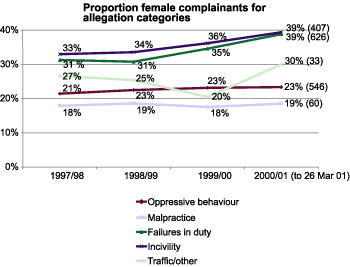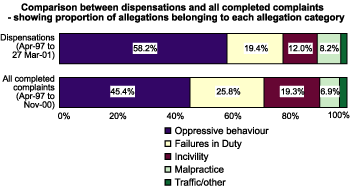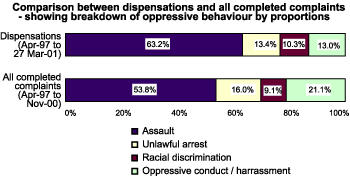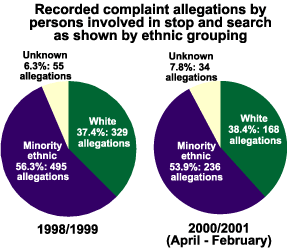Contents
Report 4 of the 10 Apr 01 meeting of the Professional Standards and Performance Monitoring Committee and gives an overview of public complaints against the MPS.
Warning: This is archived material and may be out of date. The Metropolitan Police Authority has been replaced by the Mayor's Office for Policing and Crime (MOPC).
See the MOPC website for further information.
Public complaints against the MPS
Report: 4
Date: 10 April 2001
By: Commissioner
Summary
This paper follows the overview report on complaints performance presented to the January meeting of the Professional Standards and Performance Monitoring Committee. The paper looks in greater detail at complaints by women and gives some more detail around the procedure for informal resolutions and dispensations. Also explored is a new indicator for 2001/2002, which monitors the number of complaints where a stop and search had been involved as part of the contact with police.
A. Recommendations
Members are asked to note the report.
B. Supporting information
Introduction
1. The previous report on complaints performance looked at complaint allegations and results for the years 1997/1998, 1998/1999 and 1999/2000, and partial information for 2000/2001 (April to November 2000). It is planned that a similar report giving an update of performance for the whole of 2000/2001 will be presented to a future meeting. In the interim, this report looks at performance to date in 2000/01, covering in greater detail some specific areas of performance from the previous report or raised at the January meeting.
Female complainants
2. The earlier report identified a rise in the proportion of complaints from women (in 1997/1998 the proportion of female complainants was 26 per cent , whilst in 2000/01 [to Nov-00] this had risen to 31 per cent.) The following chart shows the proportion of complaints by women in individual allegation categories. This shows a clear increase in the proportion of female complainants for allegations of incivility and failures in duty.

3. It should however be noted that, in the case of allegations of incivility, the increase in proportion does not reflect an increase in the number of complaints by women, rather a smaller reduction than that for men. (Between 1997/98 and 1999/00 complaints by women relating to incivility reduced by 20 per cent [from 554 to 444] compared with a reduction of 30 per cent [from 1126 to783] for male complainants.)
Dispensations
4. A dispensation from the requirement to investigate a complaint may be sought from the Police Complaints Authority if it appears to fall into one of the following categories:
- Anonymous - where the complaint bears no indication of the maker's identity;
- Where investigation is not reasonably practicable - for example where the complainant refuses to co-operate with the police in their enquiries;
- Repetitious - a complaint may be regarded as repetitious where it repeats, without any additional grounds and containing no fresh allegations or evidence, the substance of a previous complaint which has either been dealt with or withdrawn or resolved informally;
- Vexatious - if a dispensation is sought under this heading, a full explanation must be given to the PCA of the reasons for the request;
- Delay - a dispensation may be sought where more than 12 months have elapsed between the incident which gave rise to the allegation and the making of the complaint.
5. After establishing that a complaint falls into one or other of the above categories the PCA will be sent a memorandum explaining why it is considered to fall into the category that it does and inviting them to agree that no further action is necessary. If the PCA does not agree with the view taken, the complaint should be investigated, or if appropriate, be the subject of an attempt at informal resolution.
6. At present, it is not possible to establish, from the Complaints and Discipline System (CDS), the reason a dispensation has been sought from the PCA. To undertake this resource intensive operation would involve drawing the individual files and establishing the reason from the memorandum mentioned earlier.
7. The following, however, provides a breakdown of the allegation types for cases where dispensation has been granted, and compares this with a breakdown of allegation types for all completed complaints:

8. This illustrates that, where dispensation has been granted, there is a greater proportion of allegations of oppressive behaviour than for all completed complaint allegations. A further breakdown (below) shows that within the category of oppressive behaviour, a proportionately greater number of dispensations relate to complaints of assault.

Informal resolutions
9. Section 69(2) of the Police Act 1996 provides for consideration of informally resolving a Public Complaint after it is recorded as such. The earlier report identified that 34 per cent and 31 per cent of all completed complaint allegations (in 1998/99 and 1999/00 respectively) were resolved informally with the consent of the complainant.
10. Informal resolution is intended to provide a flexible and simple procedure for dealing with complaints of a minor nature that would otherwise attract the full length and formality of the investigation process. Complaints are suitable for informal resolution only if the conduct complained of, even if established, would not justify a criminal charge or misconduct hearing and if the complainant is content for the case to be handled in this way. Informal resolution is not available in cases where the Police Complaints Authority (PCA) is required or decides to supervise the case.
11. It should be noted that the task of the officer appointed to informally resolve the complaint is to achieve a position in which the complainant is satisfied that his or her complaint has been dealt with in an appropriate manner.
12. If in the course of the informal resolution evidence comes to light of a more serious complaint, which might require a formal investigation, the process should be terminated. Where it appears that informal resolution is impossible, or that the complaint is for any other reason not suitable for informal resolution, arrangements must be made for it to be investigated formally.
Complaints where stop and search has been used
13. As from April 2001, a new performance indicator has been established in order to monitor the number of complaint allegations made from white persons and minority ethnic persons who were involved in a Stop and Search procedure. This section looks at historic data relating to the new performance indicator.
14. Between 1998/99 and 1999/00, there was a 39.1 per cent reduction in the total number of public complaint allegations made by individuals who had been involved in a stop and search. (1998/99 = 879 allegations; 1999/00 = 535 allegations). During the first 11 months of the current financial year (Apr-00 to Feb-01) 438 complaint allegations have been recorded. (More than one complaint allegation relating to different allegation categories can be made by a complainant from an individual occurrence involving stop and search).
15. The largest proportions of these complaints in this planning year (to end Feb-01) relate to Incivility 20.8 per cent (91 allegations), Other Assault 19.9 per cent (87 allegations) and Breach of Code A [stop and search] 18.3 per cent (80 allegations). Since 1998/99, complaint allegations of both Incivility and Other Assault have consistently each made up over 18 per cent of all complaints made by people involved in stop and search. However, following the general trend of a reduction in complaints, the total numbers of allegations of all three categories, along with most other allegation categories, have fallen between 1998/99 and 1999/00.
Complaint allegations made by people involved in a stop and search procedure - shown by ethnicity of the complainant
16. A further breakdown of these recorded complaints indicates that a larger proportion of allegations have been made by minority ethnic people. The following charts show that since 1998/99, when minority ethnic people made 56.3 per cent (495 allegations) of the total complaint allegations made by those who had been involved in a Stop and Search, this level has since remained relatively constant.

17. When, however, this information is put into the context of the total number of people stopped and searched, this shows that in each year since 1998/99, the proportion of those involved in stop and search and making a complaint allegation against the MPS is small (0.3 per cent ). In 1998/99, 0.18 per cent of all white people stopped and searched made a complaint allegation, compared to 0.46 per cent of all minority ethnic persons stopped. During the current financial year 2000/01 (April – December data available only), these levels were relatively similar with 0.2 per cent of all white people and 0.4 per cent of all ethnic minority people involved in a stop and search making a complaint.
18. A breakdown by ethnicity of complainant, of types of allegations made by those involved in a stop and search procedure, indicates that a greater number of certain allegations (including Other Assault, Incivility, Breach of Code A (Stop and Search) and Racially Discriminatory Behaviour) are made by minority ethnic people compared with the number of allegations made by white people. During 2000/01 (April to February) white people made 32 complaint allegations of Other Assault, 39 of Incivility and 29 of Breach Code A (Stop and Search), while minority ethnic people made 50, 46, and 43 allegations respectively.
19. The greatest variation relates to allegations of racially discriminatory behaviour. During 2000/01 (April - February), 76.5 per cent (26 allegations) of all recorded complaints of racially discriminatory behaviour by those who had been involved in a stop and search were made by minority ethnic people. It is of note though, that in line with a reduction in all allegation categories, this number has been falling. For example in 1998/99 45 allegations, and in 1999/00 34 allegations, of racially discriminatory behaviour were made by minority ethnic people. However, caution should be taken regarding these figures, as actual numbers are relatively low.
C. Financial implications
None.
D. Background papers
- Home Office Guidance on Police Unsatisfactory Performance, Complaints & Misconduct Procedures
E. Contact details
The author of this report is Lesley Nichols and Laura Parry, MPS Corporate Performance Analysis Unit with Michael Clark, MPS Directorate of Professional Standards.
For information contact:
MPA general: 020 7202 0202
Media enquiries: 020 7202 0217/18
Send an e-mail linking to this page
Feedback